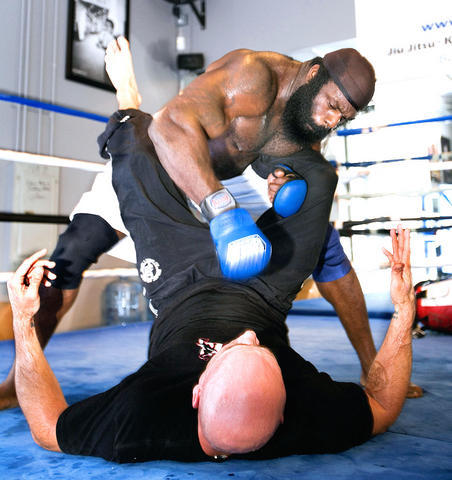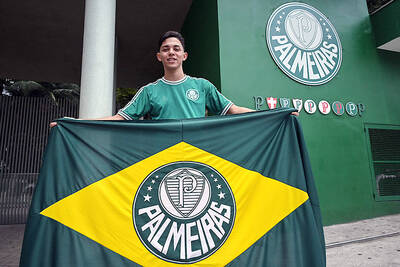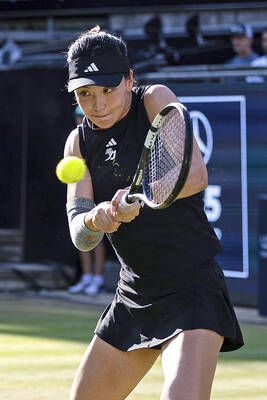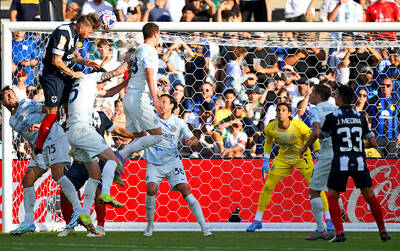He insists he has never used performance-enhancing drugs, but Jamal Patterson, a mixed martial arts fighter in the International Fight League (IFL), says he has been presumed guilty for years.
"People tell me, `You must have done something,'" he said in a telephone interview from Hoboken, New Jersey. "But genetically, I'm just a freak."
Patterson wrestled in high school and played football at Colgate University. He is 1.8m tall and has slimmed down to 93kg for his career in the IFL, a team-based mixed martial arts league, which is among several organizations striving to bring this once-underground sport into the mainstream.

PHOTO: NY TIMES NEWS SERVICE
Patterson, who competes for the IFL's Pitbulls, says he knows how crucial public perceptions can be in a pursuit that combines punching, kicking and grappling, and that casual observers sometimes still confuse with the spectacle of professional wrestling.
The sport of mixed martial arts encountered doping problems last month at an event at Los Angeles Memorial Coliseum. Royce Gracie, one of the pioneers of the sport, tested positive for the steroid nandrolone; Tim Persey tested positive for methamphetamine; and Johnnie Morton, a former NFL receiver making his mixed martial arts debut, had a higher than normal ratio of testosterone to epitestosterone in a pre-fight test, then declined to take a required post-fight test. All three were later suspended.
Performance-enhancing drugs would certainly give mixed martial arts fighters a tremendous physical benefit because they can aid strength, endurance and recovery. But mixed martial arts, a young and booming sport, has no national or international governing body and lacks a rigorous drug-testing policy.
"Part of the problem is that there are all these small organizations that fight in garages and on Indian reservations and in strip clubs, and there's no drug testing, and the rules are very limited," said Kurt Otto, commissioner and founder of the IFL. "We need to legitimize every aspect of it."
But Gracie and Morton were competing in a major event, promoted by Fighting and Entertainment Group, which is based in Japan and also promotes K-1, one of the top mixed martial arts organizations.
K-1, like the IFL and the Ultimate Fighting Championship (UFC), the two most popular mixed martial arts organizations in the US, relies primarily on state athletic commissions, which sanction mixed martial arts events in the same way they do boxing and other combat sports, to handle drug testing immediately before or after fights. But this means that in some states, not every fighter will be tested, and those who are tested will know roughly when it is coming.
"In general, I think this should not be done by the government," said Gary Wadler, an associate professor of medicine at New York University who has served on several committees for the World Anti-Doping Agency. "It should be done by an independent and transparent agency that's invested in seeing a drug-free sport."
Drug-testing programs run by athletic commissions differ from state to state. In New Jersey, which has held several mixed martial arts events this year, all fighters are tested.
California recently began testing all fighters.
Gracie was suspended for a year from the date of the fight (June 2) and fined US$2,500, pending his appeal.
But at least one state does no drug testing at all.
"Our policy is that it's up to the promoter to do the testing," said Patrick Shaughnessy, a spokesman for the Texas Department of Licensing and Regulation.
The Ultimate Fighting Championship held its first event in Texas in April in Houston, and none of the fighters were tested, said Marc Ratner, the UFC's vice president for regulatory affairs.
"That doesn't make sense to me," he said.
Ratner, who spent 13 years as executive director of the Nevada State Athletic Commission, said the UFC hired an independent laboratory to test four fighters at an event last month in Ireland.
Neither the Ultimate Fighting Championship nor the International Fight League have a formal policy for the punishment and appeals process for fighters who fail a drug test.
Otto said he hoped the IFL would have a program in place before the 2008 season begins.
Patterson and Pitbulls coach Renzo Gracie, a cousin of Royce Gracie, said they hoped the IFL would adopt random testing.
"It's not a witch hunt," Gracie said. "It's what the sport asks for."

Brazil has four teams, more than any other country, in the expanded Club World Cup that kicked off yesterday in the US, but for SE Palmeiras, the competition holds a special meaning: winning it would provide some redemption. Under coach Abel Ferreira since 2020, Palmeiras lifted two Copa Libertadores titles, plus Brazilian league, cup and state championships. Even before Ferreira, it boasted another South American crown and 11 league titles. The only major trophy missing is a world champions’ title. Other Brazilian clubs like Fluminense FC and Botafogo FR, also in the tournament, have never won it either, but the problem for Palmeiras

Lionel Messi drew vast crowds and showed flashes of his brilliance when his Inter Miami side were held to a goalless draw by African giants Al-Ahly as the revamped FIFA Club World Cup got off to a festive start on Saturday. Fans showed up en masse for the Group A clash at the Hard Rock Stadium, home to the NFL’s Miami Dolphins, but Messi could not fully deliver, his best chance coming through a last-second attempt that was deflected onto the crossbar. Inter Miami next face FC Porto on Thursday in Atlanta, while Al-Ahly, who benefited from raucous, massive support, are to

Twelve days after winning her second Grand Slam title at the French Open, Coco Gauff fell at the first hurdle on grass in Berlin on Thursday as beaten Paris finalist Aryna Sabalenka advanced to the quarter-finals. Recipient of a first round bye, American Gauff lost 6-3, 6-3 to Chinese qualifier Wang Xinyu as world number one Sabalenka beat Rebeka Masarova 6-2, 7-6 (8/6) in her second round tie. Winner of 10 main tour titles, including the US Open in 2023 and the WTA Finals last year, Gauff has yet to lift a trophy in a grass-court tournament. “After I won the first

Sergio Ramos on Tuesday outfoxed two Inter players and artfully headed home the first goal for Monterrey at the FIFA Club World Cup. The 39-year-old Ramos slipped through the penalty area for the score just as he did for so many years in the shirts of Real Madrid and Spain’s national team, with whom he combined smarts, timing and physicality. Ramos’ clever goal and his overall defensive play at the Rose Bowl were major factors in Monterrey’s impressive 1-1 draw against the UEFA Champions League finalists in the clubs’ first match of the tournament. “There is always a joy to contribute to the